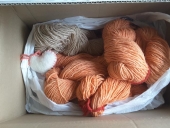In general, animal fibers tend to be warmer and lighter weight than plant fibers. Wool in particular is known for water-repellence and staying warm even when wet. (Camelid fibers like alpaca are known for being warmer than wool when kept dry.) Plant fibers, on the other hand, are absorbent and stay cooler even in warm weather. Bast fibers like
Flax, hemp, and ramie are stronger and more durable than cotton. They wick moisture better and are thus less likely to become sodden if you work up a sweat. They are also more expensive than cotton.
In terms of how they feel to work with, wool can be scratchy and irritate the skin, but it has a bit of give and the residual lanolin can help to moisturize the skin. Of the common plant fibers, cotton is usually the smoothest. Bast fibers can be smooth or rough depending on how they are prepared, so feel them before you buy. Hold the yarn up to your cheek to decide if it is too scratchy, because your cheeks are more sensitive than your fingertips. Because plant fibers don't have as much give as animal fibers, knitting them for extended stretches of time can make your finger tendons and muscles sore. They can also dry your hands out, so take lotion breaks when you knit with plant fibers.
Be aware that a project that big will probably take several months to make.







